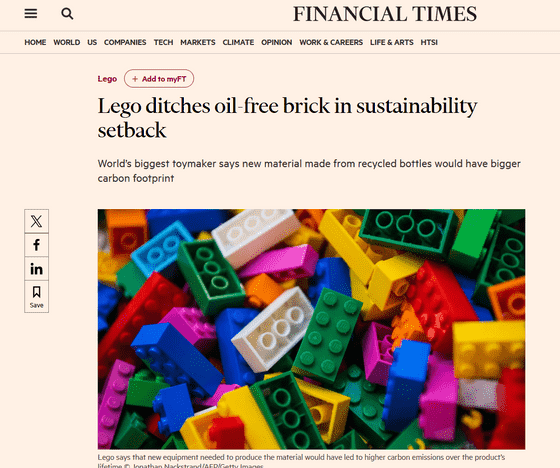Lego announces that ``recycled plastics have not helped reduce carbon''

Lego, a Danish toy company, has announced that it will discontinue a project to replace Lego blocks with oil-free blocks after discovering that using ``oil-free blocks'' made from recycled plastic bottles actually increases carbon dioxide emissions. did.
Lego ditches oil-free brick in sustainability setback | Financial Times
https://www.ft.com/content/6cad1883-f87a-471d-9688-c1a3c5a0b7dc

Lego drops prototype blocks made of recycled plastic bottles as they 'didn't reduce carbon emissions' - CBS News
Lego abandons one of its projects to make oil-free bricks -FT | Reuters
https://www.reuters.com/sustainability/lego-abandons-effort-make-oil-free-bricks-ft-2023-09-24/
Lego has previously set a goal of ``to completely eliminate petroleum-based plastics from the approximately 20 types of materials used in Lego sets by 2030,'' and in 2018 they announced that they would replace plastics from tree and grass parts with petroleum-derived polyethylene. Since then, I have been switching to plant-based materials.
Lego announces that it will use actual plants as raw materials for 'plant blocks' - GIGAZINE

Furthermore, in 2021, the company announced that it had developed a prototype Lego block made from recycled plastic bottles instead of ABS resin , which is made from petroleum.
According to the announcement, Lego's research and development team tested more than 250 types of polyethylene terephthalate (PET) materials and hundreds of other plastic formulations to complete the prototype. As a result, one 1-liter plastic bottle produced enough raw material to make about 10 Lego blocks with 2 protrusions in 4 rows.
However, recycled PET (RPET) is less strong than ABS, so replacing ABS with other materials while maintaining what Lego calls 'clutching force' is strength for assembly and disassembly. It was an extremely difficult task. Additionally, additional materials were required to provide the same safety and durability as existing plastics, which required more energy to process.
Tim Brooks, Lego's head of sustainability, says, ``Making blocks with RPET was like trying to make a bicycle out of wood instead of steel.''

Lego CEO Niels Christiansen told the Financial Times: ``We found that using RPET requires equipment upgrades and increases the amount of carbon dioxide emitted over the product's lifetime.'' He revealed that he had given up on using oil-free blocks.
Going forward, LEGO has set a goal of reducing carbon dioxide emissions by 37% compared to 2019 by 2032 by considering other recycled materials and improving manufacturing efficiency with ABS materials.
'Legos made from sustainable alternative materials, including other recycled plastics and plastics made from alternative sources such as ' e-methanol ,' which is methanol made from renewable energy,' the company told the media. We are developing and testing the block.”
Related Posts:
in Note, Posted by log1l_ks






